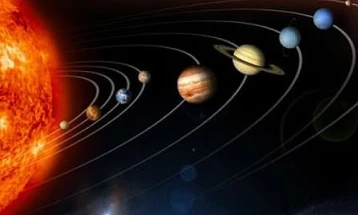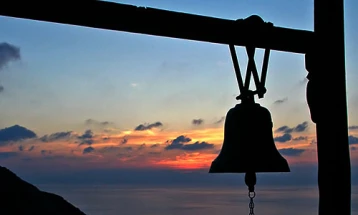Today in history
- 26 September 2024 (MIA)

26 September 2024 (MIA)
– European Day of Languages
46 BC – Julius Caesar dedicates a temple to his mythical ancestor Venus Genetrix in accordance with a vow he made at the battle of Pharsalus.
715 – Ragenfrid defeats Theudoald at the Battle of Compiègne.
1087 – William II is crowned King of England, and reigns until 1100.
1212 – Golden Bull of Sicily is issued to confirm the hereditary royal title in Bohemia for the Přemyslid dynasty.
1345 – Friso-Hollandic Wars: Frisians defeat Holland in the Battle of Warns.
1371 – The forces of the Ottoman sultan Murad I’s lieutenant Lala Şahin Pasha and Balkan lords led by Vukašin Mrnjavčević and Jovan Uglješa clash at the Battle of Maritsa.
1493 – Pope Alexander VI issues the papal bull Dudum siquidem to the Catholic Monarchs, extending the grant of new lands he made them in Inter caetera.
1580 – Sir Francis Drake finishes his circumnavigation of the Earth.
1687 – The Parthenon in Athens is partially destroyed by an explosion caused by the bombing from Venetian forces led by Morosini who are besieging the Ottoman Turks stationed in Athens.
1687 – The city council of Amsterdam votes to support William of Orange’s invasion of England, which became the Glorious Revolution.
1777 – American Revolution: British troops occupy Philadelphia.
1789 – Thomas Jefferson is appointed the first United States Secretary of State, John Jay is appointed the first Chief Justice of the United States, Samuel Osgood is appointed the first United States Postmaster General, and Edmund Randolph is appointed the first United States Attorney General.
1792 – Marc-David Lasource begins accusing Maximilien Robespierre of wanting a dictatorship for France.
1810 – A new Act of Succession is adopted by the Riksdag of the Estates and Jean Baptiste Bernadotte becomes heir to the Swedish throne.
1907 – New Zealand and Newfoundland each become dominions within the British Empire.
1910 – Indian journalist Swadeshabhimani Ramakrishna Pillai is arrested after publishing criticism of the government of Travancore and is exiled.
1914 – The United States Federal Trade Commission (FTC) is established by the Federal Trade Commission Act.
1917 – World War I: The Battle of Polygon Wood begins.
1918 – World War I: The Meuse-Argonne Offensive, the bloodiest single battle in American history, begins.
1923 – Gustav Stresemann resumes the Weimar Republic’s payment of reparations.
1933 – As gangster Machine Gun Kelly surrenders to the FBI, he shouts out, “Don’t shoot, G-Men!”, which becomes a nickname for FBI agents.
1934 – Steamship RMS Queen Mary is launched.
1942 – The Holocaust: August Frank, a higher official of the SS concentration camp administration department, issues a memorandum containing a great deal of operational detail in how Jews should be “evacuated”.
1944 – World War II: Operation Market Garden fails.
1944 – World War II: On the central front of the Gothic Line Brazilian troops control the Serchio Valley region after 10 days of fighting.
1950 – United Nations troops recapture Seoul from North Korean forces.
1950 – Indonesia is admitted to the United Nations.
1954 – Japanese rail ferry Tōya Maru sinks during a typhoon in the Tsugaru Strait, Japan, killing 1,172.
1959 – Typhoon Vera, the strongest typhoon to hit Japan in recorded history, makes landfall, killing 4,580 people and leaving nearly 1.6 million others homeless.
1960 – In Chicago, the first televised debate takes place between presidential candidates Richard M. Nixon and John F. Kennedy.
1969 – Abbey Road, the last recorded album by The Beatles, is released.
1973 – Concorde makes its first non-stop crossing of the Atlantic in record-breaking time.
1980 – At the Oktoberfest terror attack in Munich 13 people die and 211 are injured.
1981 – Baseball: Nolan Ryan sets a Major League record by throwing his fifth no-hitter.
1983 – Soviet nuclear false alarm incident: Military officer Stanislav Petrov identifies a report of an incoming nuclear missile as a computer error and not an American first strike.
1983 – Australia II wins the America’s Cup, ending the New York Yacht Club’s 132-year domination of the race.
1984 – The United Kingdom and China agree to a transfer of sovereignty over Hong Kong, to take place in 1997.
1997 – A Garuda Indonesia Airbus A300 crashes near Medan, Indonesia, airport, killing 234.
1997 – An earthquake strikes the Italian regions of Umbria and the Marche, causing part of the Basilica of St. Francis at Assisi to collapse.
2000 – Anti-globalization protests in Prague (some 20,000 protesters) turn violent during the IMF and World Bank summits.
2000 – The MS Express Samina sinks off Paros in the Aegean Sea killing 80 passengers.
2002 – An overcrowded Senegalese ferry, MV Le Joola, capsizes off the coast of the Gambia killing more than 1,000.
2007 — Shinzō Abe formally ends his first term as Prime Minister of Japan.
2008 – Swiss pilot and inventor Yves Rossy becomes first person to fly a jet engine-powered wing across the English Channel.
2009 – Typhoon Ketsana hits the Philippines, China, Vietnam, Cambodia, Laos and Thailand, causing 700 fatalities.
2014 – World Health Organizations estimates that Ebola death toll has reached 3,091 – with Liberia, Guinea and Sierra Leone hit hardest.
2017 – Saudi Arabia announces it is overturning its ban on women driving – last country in the world to do so.
2019 – WHO announces 800,000 children in DR Congo will be vaccinated in nine days in worlds’s largest measles epidemic that has taken over 3,500 lives.
2020 – US President Donald Trump nominates Judge Amy Coney Barrett for the US Supreme Court to replace Ruth Bader Ginsburg.
2021 – Switzerland votes to legalize same-sex marriage in nationwide referendum.







